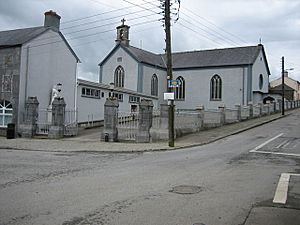William Worth (Irish judge) facts for kids
William Worth (born around 1646, died 1721) was an important Irish judge who lived in the late 1600s and early 1700s. He came from a well-known family and had a long career in law, even though there were many political changes in Ireland during his lifetime.
Contents
Who Was William Worth?
William Worth was born in Cork city in Ireland. He was the oldest son of Edward Worth, who was a church leader (called a Dean) in Cork and later became a Bishop in Killaloe. His mother was Susanna Pepper. William's family, the Worths, originally came from a place called Cheshire in England. They moved to County Cork in Ireland in the 1500s. William's grandfather, James, was the first vicar (a type of priest) in Newmarket, County Cork.
William's father, Bishop Edward Worth, was very good at politics. He worked with the government of Oliver Cromwell for a while. But when King Charles II returned to power, Edward Worth was still seen as loyal to the King. Even though he was influential, his political power lessened after 1660.
William Worth's Career in Law
William Worth went to Trinity College Dublin in 1661 to study. He then studied law in London and Dublin. In 1669, he became a lawyer. He quickly rose through the ranks, becoming a "Recorder" (a judge who helps a town with its legal matters) for Kinsale in 1676 and then for Cork in 1678. In 1681, he became the Attorney General for County Tipperary and also a Baron of the Court of Exchequer (Ireland). This was a high position in the legal system.
William's strong Protestant background helped him get these important jobs. At that time, there was a lot of fear about Catholics in England and Ireland, known as the Popish Plot. This made people who were strongly Protestant more likely to get high positions.
Political Challenges and Changes
Because William Worth was a strong Protestant, people expected him to support the Glorious Revolution of 1688. This was when the Catholic King James II was replaced by the Protestant King William III and Queen Mary II. When King James II came to Ireland in 1689, William Worth was removed from his job as a judge.
Unlike some other judges who were stopped from leaving Ireland, William Worth was allowed to go to England. When he came back to Ireland, he tried to get his old job back as a Baron of the Exchequer. He even tried to become the Lord Chancellor of Ireland, which is the highest judge in the country. However, he was not successful. It's a bit surprising because other Protestant judges who had been removed by King James II did get their jobs back.
After this, William Worth spent some time managing the large estates (lands and properties) of James Butler, 2nd Duke of Ormonde.
Worth's Wealth and Homes
William Worth was a very wealthy man. He was also generous and gave money to his old university, Trinity College Dublin. He owned a large house in Aungier Street in Dublin. He also had country homes in Rathfarnham (which is now a part of south Dublin) and nearby Oldbawn. He probably got the Oldbawn house from his second wife's family, the Tyntes.
William Worth's Family Life
William Worth was married four times during his life. His third and fourth marriages were quite unusual for today, as he married the widows of a father and then his son!
- His first wife was Alicia Barnet. They had a son named Edward.
- His second wife was Mabel Tynte. They had a son named James.
- His third wife was Dorothy Whitfield. She was already a widow when they married around 1687. She passed away in 1705.
- His fourth wife was Lucy Downing. She was also a widow, and strangely, she was the widow of Dorothy's stepson. This marriage was short, as Lucy died in 1711.
William Worth passed away in 1721 and was buried in his family's tomb at St. Patrick's Cathedral in Dublin. He left a lot of his money to his nephew, Edward Worth, who was a doctor and a famous book collector.
William's oldest son, Edward, inherited the Rathfarnham estate. When Edward died in 1741, his four daughters shared the estate. William's younger son, James, inherited lands from an uncle and took on the Tynte family name. He married Hester Bulkeley and died in 1758.
Images for kids
 | James B. Knighten |
 | Azellia White |
 | Willa Brown |



